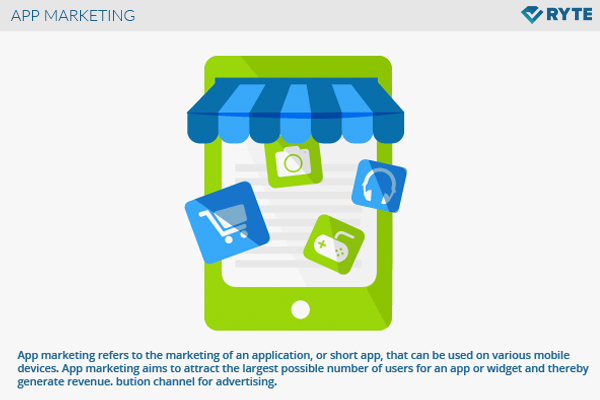App Marketing
App marketing refers to the marketing of an application, or short app, that can be used on various mobile devices. App marketing aims to attract the largest possible number of users for an app or widget and thereby generate revenue. App marketing can be classified as a part of mobile marketing, but differs from mobile marketing by focusing on apps, whereas in mobile marketing, mobile devices are considered to be the distribution channel for advertising.
General Information
With the increasing use of mobile devices, apps and widgets have become popular as well. The number of smartphone users has grown steadily in recent years and as of February 2014 was more than 40 million in Germany alone.[1]
Apps are available in various designs and usually have very specialized functions which users regard as helpful. But before apps attract user attention, they must be marketed. In many cases this is handled by specialized agencies, but you can also do your own marketing providing you observe several basic rules.
Features
App marketing is supposed to generate the largest possible user coverage. At the same time, segmentation of the various target groups is enormously important, otherwise wastage would be too high. Users may be technologically adept, early adopters or interested in a particular subject area. Consequently, one must focus on specific target groups. Different channels can be identified based on the target group to which the app should be marketed.
A multichannel strategy combines the advantages of segmentation with the widest possible target group. Social media, blogs, various app stores like iTunes or Google Play Store, press releases or reviews by real users who can test the app before its launch, are possible channels to market an app.
Before marketing can begin there must be a good idea. Users want specific functions when using apps or widgets. Something new, innovative or original can attract users more quickly than a copy of a well-known app. An idea goes hand in hand with a good concept. To this end, the following questions should be answered:
- How can the USPs (unique selling points) of the app be identified?
- How should it be designed?
- What kind of user experience should the app offer?
All these factors play important roles in development and marketing. Based on content, marketing can be done within the framework of storytelling and utilize various documentation formats to bring the app to the users. Influencers, bloggers or professionals can possibly be signed up as reinforcing factors. They can test the app, evaluate it, and make it known if it provides what it promises.
Last but not least, the app and marketing concept should be optimized for the particular platform on which it is to be marketed. App store optimization is definitely recommended. Freemium and premium models should be considered to offer an initial incentive to download the app, then to be able to generate revenue as the next step via a premium model.
If you market your app, you must follow the guidelines of the app marketplaces and certain legal aspects should be taken into account. Whether iTunes Store, Google Play Store or other marketplaces where apps are offered for download, each platform has its own rules and if these are not complied with, one may be excluded from that distribution channel. Sexual material, violence, bullying or gambling is prohibited on all platforms.
Property rights such as patents, trademarks and copyrights shall not be infringed. At the same time, it is important to follow the guidelines for downloads, subscriptions, and advertising campaigns. These aspects should be examined prior to launching an app. Real customer reviews, the use of foreign brands in keyword advertising and various clauses of the competition law are relevant aspects of marketing.
Importance for SEO
App marketing can be used specifically to direct traffic to mobile websites or landing pages. Deep links can be set in apps to expand the app in a topically appropriate way. They may direct to screens in the app and thus refer to special parts of it, for example, a mobile website.
Such content is also visible to Google. App indexing describes from this process the perspective of search engines and the Mobile Googlebot is always looking for relevant mobile sites. It is important to maintain an overall overview in app marketing. You should create an informative website before launching an app. Optionally, a landing page can be distributed via email, social media or other channels. Websites that complete the offer of the app should, of course, generate downloads, but they can also be considered positive signals for search engines, similar to press releases, reviews from bloggers or many interactions in social media channels.
References
- ↑ Number of smart phone users in Germany in the years 2009 to 2014 (in millions) de.statista.com. Accessed on 05/19/2014

